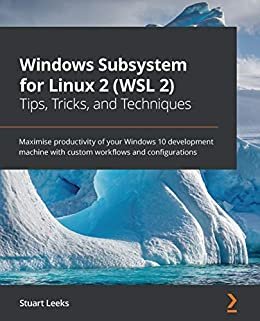
Windows Subsystem for Linux 2 (WSL 2) Tips, Tricks, and Techniques: Maximise productivity of your Windows 10 development machine with custom workflows and configurations (English Edition)
- 作者
- Stuart Leeks
- 语言
- 英语
- 出版社
- Packt Publishing 版次:第 1st 版
- 出版日期
- 2020年10月23日
- 纸书页数
- 246页
- 电子书格式
- epub,pdf,mobi,azw3,txt,fb2,djvu
- 文件大小
- 8965 KB
- 下载次数
- 867
- 更新日期
- 2023-06-11
- 运行环境
- PC/Windows/Linux/Mac/IOS/iPhone/iPad/iBooks/Kindle/Android/安卓/平板
内容简介
A practical handbook that will help you bridge the gap between Windows and Linux to develop apps that leverage the best features across both ecosystems with seamless interoperability
Key Features
Configure and control WSL to suit your needs and preferences
Discover tips for working seamlessly between Windows and WSL Linux distros
Learn how to work effectively with containers in WSL, as well as how to containerize your development environments with Visual Studio Code to isolate your dependencies
Book Description
Windows Subsystem for Linux (WSL) allows you to run native Linux tools alongside traditional Windows applications. Whether you’re developing applications across multiple operating systems or looking to add more tools to your Windows environment, WSL offers endless possibilities.
You’ll start by understanding what WSL is and learn how to install and configure WSL along with different Linux distros. Next, you'll learn techniques that allow you to work across both Windows and Linux environments. You’ll discover how to install and customize the new Windows Terminal. We'll also show you how to work with code in WSL using Visual Studio Code (VS Code). In addition to this, you’ll explore how to work with containers with Docker and Kubernetes, and how to containerize a development environment using VS Code.
While Microsoft has announced support for GPU and GUI applications in an upcoming release of WSL, at the time of writing these features are either not available or only in early preview releases. This book focuses on the stable, released features of WSL and giving you a solid understanding of the amazing techniques that you can use with WSL today.
By the end of this book, you’ll be able to configure WSL and Windows Terminal to suit your preferences, and productively use Visual Studio Code for developing applications with WSL.
What you will learn
Install and configure Windows Subsystem for Linux and Linux distros
Access web applications running in Linux from Windows
Invoke Windows applications, file systems, and environment variables from bash in WSL
Customize the appearance and behavior of the Windows Terminal to suit your preferences and workflows
Explore various tips for enhancing the Visual Studio Code experience with WSL
Install and work with Docker and Kubernetes within Windows Subsystem for Linux
Discover various productivity tips for working with Command-line tools in WSL
Who this book is for
This book is for developers who want to use Linux tools on Windows, including Windows-native programmers looking to ease into a Linux environment based on project requirements or Linux developers who've recently switched to Windows. This book is also for web developers working on open source projects with Linux-first tools such as Ruby or Python, or developers looking to switch between containers and development machines for testing apps. Prior programming or development experience and a basic understanding of running tasks in bash, PowerShell, or the Windows Command Prompt will be required. Table of Contents
Introduction to the Windows Subsystem for Linux
Installing and Configuring the Windows Subsystem for Linux
Getting Started with Windows Terminal
Windows to Linux Interoperability
Linux to Windows Interoperability
Getting More from Windows Terminal
Working with Containers in WSL
Working with WSL Distros
Visual Studio Code and WSL
Visual Studio Code and Containers
Productivity Tips with Command-Line Tools
Windows Subsystem for Linux 2 (WSL 2) Tips, Tricks, and Techniques: Maximise productivity of your Windows 10 development machine with custom workflows and configurations (English Edition) EPUB, PDF, MOBI, AZW3, TXT, FB2, DjVu, Kindle电子书免费下载。
- 办事的艺术(说话不是三言两语,办事不能简单凑合) 邢群麟、姚迪雷编著
- The Complete Edition – Software Engineering for Real-Time Systems: A software engineering perspective toward designing real-time systems (English Edition) Jim Cooling
- 增一阿含经(下册)【豆瓣9.6高分推荐!线装书局出品!一套书读通佛教“根本佛法”!阿含经专家、苏州西园寺沙门恒强以及梁踌继校注,以高丽藏为底本,保持原本整体风貌,历时数年精心校订!原文+精心注释,文白对照,阅读无障碍!】 恒强、梁踌继
- Hands-On SQL Server 2019 Analysis Services: Design and query tabular and multi-dimensional models using Microsoft's SQL Server Analysis Services (English Edition) Steven Hughes、Adam Jorgensen
- 人际关系心理学(此书能让你像“魔鬼”一样思考,像“天使”一样受人欢迎) 宿文渊编著
- 明代气范畴思想研究 陈慧麒
- 做最好的自己:你的形象价值千万(形象改变了,性格会随着改变;性格改变了,人生也会随着改变) 桑楚编著
- 人大文撷2020年第1辑 全国人大图书馆
- 《帝国主义是资本主义的最高阶段》导读(增订版) 赵甲明、王代月编著
- CentOS Quick Start Guide: Get up and running with CentOS server administration (English Edition) Shiwang Kalkhanda
- 朱子读书法 齐熙 朱熹 ,张洪
- 把信送给加西亚(安德鲁接到麦金利总统的一件看似不可能完成的任务,他踏上了“送信”的征程) (美)哈伯德
- Learn SQL Database Programming: Query and manipulate databases from popular relational database servers using SQL (English Edition) Josephine Bush
- 你若安好,便是晴天霹雳 ("癫"倒众生系列) 如来神爪
- 人生三境(悠悠岁月中,你我皆过客。我们不必彷徨、犹豫、茫然,完全可以选择脚踏实地从容生活,达到人生的理想境界) 文明德编著
- 中国人大与国外议会比较研究 陈文博
- 故宫疑案 阎崇年
- 广东省惠州市罗浮山保护立法调研报告 易清、陈友乔、彭小丁、宋振凌
- 中华人民共和国固体废物污染环境防治法:附新旧条文对照 《中华人民共和国固体废物污染环境防治法:附新旧条文对照》编写组
- 电影视觉空间研究 唐建军
- 人民政协若干理论问题探索 章林、赵连稳
- 国际海洋争端解决规则及案例评析 王超, 邱文弦
- 强者的成功法则(一本震撼人心的个人、团队、企业奋斗的成功学全书) 夏志强编著
- 中国环境保护法律制度 崔桂台 主编
- 有你真好 郑羽书、林德欣
- 别让心态害了你(为那些正处于负面心态和情绪的人们指出了一条走出困境的途径) 庞丽娟
- 影响力 意志力 创新力(本书在总结众多成功人士经验的基础上,全面、深入地揭示了影响力、意志力和创新力的内涵和现实意义) 邢群麟、胡宝林编著
- 人大文撷2019年第5辑 全国人大图书馆
- 怪癖心理学(揭示怪癖的真相:完美主义、洁癖、强迫症、多重人格等,所有的怪癖都是内心欲望的投射。你的影子操纵着你) 张卉妍编著
- 别让坏脾气害了你(一本书教你如何调节情绪,如何控制心情和欲望,如何在脾气突如其来的瞬间百忍成金,成为一个脾气好运气好幸福多的人) 邢群麟编著